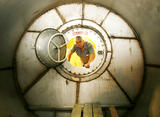|
Wanted: Volunteers willing to simulate Mars mission by making epic journey to nowhere
Wanted: Volunteers willing to simulate Mars mission by making epic journey to nowhere
It might sound like another dysfunctional reality-TV series, but Russia's space agency is sifting through thousands of applications from would-be astronauts prepared to simulate an epic and far-distant manned mission to Mars
 |
A staff member of the Institute for Biomedical Problems in Moscow staff inspects one of the modules of a "spaceship" that will be used to simulate a trip to Mars.
PHOTO: AFP |
Wanted: volunteers willing to spend 520 days in a sex-free barrel. Applicants need to be fluent in English and Russian. No TV but books and films available.
It might sound like another dysfunctional reality-TV series but Russia's space agency is sifting through thousands of applications from would-be astronauts prepared to simulate an epic and far-distant manned mission to Mars. Instead of setting foot on the Red Planet, the astronauts will reside in a cramped barrel-shaped spacecraft in central Moscow. The tiny modules are designed to replicate the psychological pressures of a long space voyage. The astronauts will be locked inside for a year and a half: 250 days to Mars, followed by a month on the surface, and 240 days to get back.
Mark Belakovsky, head of the Mars 500 project, said Thursday: "We want applicants who are healthy and professional. They have to be intellectually tough."
Belakovsky, of the Institute of Biomedical Problems, said male and female applicants had to be aged 25 to 50. Doctors would be preferred, he said.
"We've had applicants from Britain," he added. "If British firms would like to supply us with books, films, or food we would be happy to hear from them."
The institute and the European Space Agency (ESA) are separately considering applications for the mock voyage as well as two experiments in November and early 2008, also with crews of six.
ESA will select two of the six crew members. "So far, 4,600 people have applied. Most say that they've been interested in space flight since childhood but for personal reasons haven't got round to it," an ESA spokeswoman said.
Once the main study gets under way crew members will remain on board for the duration, barring emergencies. "They will have taken off, and that's it," Belakovsky said.
Astronauts will be exposed to all aspects of life in space, apart from radiation and weightlessness. Communicating with mission control will be subject to a 20-minute delay: the time taken to send a signal to Earth. Before they "land," three astronauts destined to "live" on Mars will spend a month in a separate module, lying on their backs with their heads lower than their feet to simulate zero gravity.
The crew will spend most of their time in a 150m3 living module, which has personal cabins, as well as a common room and kitchen. Volunteers will be paid for taking part in the study.
All food and water will be taken on board before the trip. Alcohol and smoking will be forbidden, and sex frowned upon. "It's not a reality show - it is a serious pioneering research experiment," Belakovsky said, adding that there would be moments of tension. "If you and your girlfriend were to shut yourselves in a room for three days, five days, a month - believe me, you would have a million problems. Either she would strangle you or you would strangle her."
Belakovsky conceded that a real manned mission to Mars was unlikely to get under way before the late 2020s. In 2004, US President George Bush described landing on Mars as a long-term goal of Nasa. The European Space Agency hopes to get humans there by 2035.
In the meantime, experts are unsure whether Mars, which has polar ice caps that make it the most Earth-like planet in the solar system, might harbor life. Several probes have failed to find proof.
Luke Harding
The Guardian, July 14, 2007
http://www.guardian.co.uk/international/story/0,,2125273,00.html
http://www.taipeitimes.com/News/feat/archives/2007/07/14/2003369582/print
|